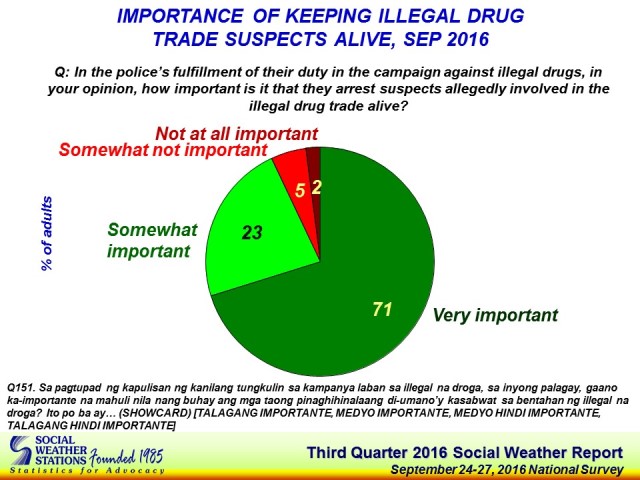Making Sense of the Surveys: Keep Suspects Alive

Photo from Social Weather Stations
THE NUMBERS are out. The Social Weather Stations (SWS) survey for the third quarter of 2016 revealed that the majority, or 84 percent, of 1,200 respondents were satisfied with the government’s anti-illegal drug campaign. Eight percent were dissatisfied, with the remaining eight percent undecided. The Duterte administration has repeatedly paraded these numbers either to encourage supporters or refute critics. The Palace communications team has one simple message—the people are with us.
Yet the same survey found out that 94 percent of the respondents believe it is important that in the campaign against illegal drugs, suspects be kept alive (23 percent believe that it is “somewhat important,” while 71 percent believe it is “very important”). This finding is at odds with the way the drug war—which by now has killed more than 4,000 people, of which more than 1,600 were killed during police operations—is being waged by the administration.
The survey revealed the public’s support for the drug war, but made it clear that the same public wants the killing of suspects to stop. This sentiment is in the context of the Chief Executive’s vowing to rid the country of the drug menace by encouraging the police to kill drug suspects and even offering them immunity from prosecution.
The media have not given the significance of this finding the prominence it deserves. Their reports focused mostly on the public’s satisfaction with the government’s anti-illegal drug campaign. The importance of suspects being kept alive was mentioned only in passing. There was also no further discussion or context to explain how this response to the drug-related killings relates to the administration’s drug war.
Reports from both TV and print cited Presidential Spokesperson Ernesto Abella and Presidential Communications Secretary Martin Andanar’s claim that “the survey tells us that a majority of the people trust the actions of the President” and that “the Duterte administration does not condone summary execution or extrajudicial killing.”
None of the reports however contested these statements nor offered other insights into the survey results. The fact alone that a large percentage of the respondents value the lives of those perceived as drug suspects, could have been a take-off point for critical analysis. But once again, the media seemed to have bought the administration’s propaganda line.
If the government wants to continue playing their “public support” card, they must first address the criticism of the people implicit in the survey result. The media have the responsibility to ensure that the public’s sentiments will not be drowned by propaganda and eventually left out of the discourse.
Leave a Reply